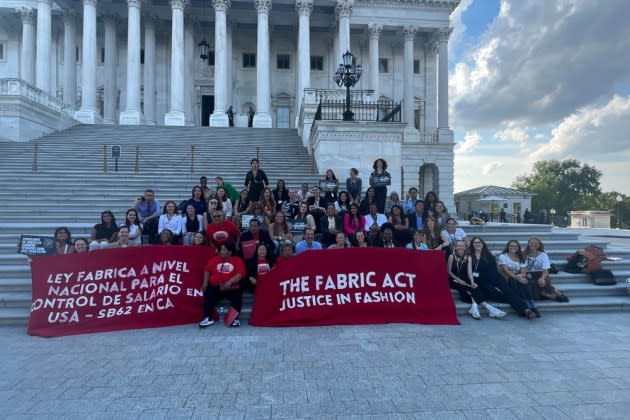FABRIC Act is Reintroduced in Congress
- Oops!Something went wrong.Please try again later.
- Oops!Something went wrong.Please try again later.

A bill that seeks to improve conditions for 100,000 U.S. garment workers is getting another shot at becoming law.
On Thursday, Senator Kirsten Gillibrand and Congressman Jerrold Nadler reintroduced the Fashioning Accountability and Building Real Institutional Change, or FABRIC, Act, a move to put an end to what the New York Democrats describe as the “misuse” of piece-rate pay, which doles out pennies for every hem sewn or button stitched rather than a consistent wage.
More from Sourcing Journal
Beyond Yoga Suppliers Outed in $1 Million Wage Theft Investigation
Labor Rights Groups Call for 'Indefinite' Strike in Bangladesh
The measure also aims to boost domestic apparel manufacturing by creating a $50 million per year support program, administered by the Department of Labor, that will administer grants and technical aid to manufacturers in need of assistance with facilities and equipment upgrades, safety improvements and training and workforce development.
The idea, which draws from California’s Garment Worker Protection Act, or SB 62, is to hold brands accountable for the labor practices of their manufacturing partners, compelling them to “become allies” in fighting workplace violations, Gillibrand said.
“The popularization of the fast fashion business model has perpetuated abuse of an already underpaid and overworked workforce, promoting profits over people, overconsumption, and rampant wage theft,” she said. “From designers to workers, women, people of color and immigrants shoulder this burden.”
Senators Cory Booker (D-N.J.), Dianne Feinstein (D-Calif.), Alex Padilla (D-Calif.), Bernie Sanders (I-Vt.) and Elizabeth Warren (D-Mass.) are original co-sponsors of the FABRIC Act, which was introduced in the Senate last May. Congresswomen Debbie Dingell (D-Mich.) and Deborah Ross (D-N.C.) debuted the bill in the House of Representatives that July.
“As the representative of New York’s storied Garment District, I’m proud to join Senator Gillibrand in introducing the FABRIC Act today, legislation that will advance historic protections for garment workers and revitalize fashion manufacturing in the United States,” Nadler said. “With domestic fashion manufacturing having declined precipitously, the FABRIC Act is essential to bringing back these jobs from overseas while holding manufacturers accountable for labor violations that are far too common in the industry.”
U.S. garment workers experience the second-highest rate of wage theft of any group of workers in the country. Their numbers have also declined throughout the decades, falling from a height of 1.4 million in April 1973 to 91,200 as of August, even as apparel imports from China grew eightfold and the Asian superpower gained roughly 1.25 million jobs in apparel and apparel-adjacent manufacturing.
Gillibrand said that the U.S. garment industry now misses out on more than $23 billion worth of clothing that is instead imported from China.
“Protecting the garment workforce has direct impacts on economic prosperity, environmental sustainability, and gender equality. It’s time to take bold action at the federal level to change the fabric of the American garment manufacturing industry so we can protect these vital workers and not only make American, but buy American,” she said.
If signed into law, the measure will create a new Undersecretary of Labor of the Garment Industry to oversee enforcement of its provisions. It will also establish a nationwide garment industry registry to ensure manufacturers and contractors operate according to minimum labor standards.
“It is unconscionable in 2023 that the makers of our clothes do not make enough to feed their families,” said Ayesha Barenblat, CEO of Remake, a fashion advocacy group that is among the bill’s 200 endorsers, including brands like Everlane, Mara Hoffman, Outerknown and Reformation.
Barenblat was one of a group of 80, including members of the Garment Worker Center in Los Angeles, garment workers and their children, who met with lawmakers on Capitol Hill this week to drum up support for the bill.
“Joining forces and voices, we made history by implementing SB 62 into California law, and now we want the same justice extended for all garment workers in all 50 states,” said Cris, a garment worker from California with 20 years of experience. “We want justice for the workers in the garment industry. Because it is a worker’s right to earn a fair wage. The FABRIC Act would make earning a living wage a possibility for workers across America.”
Enedina, a garment worker in San Antonio, Texas, agreed.
“I would like to see the FABRIC Act pass and see fair wages for all garment workers,” she said. “We need a law that protects fair labor wages. We need a guarantee of safe and respectful jobs because what we earn now sometimes doesn’t even cover the basic necessities.”
